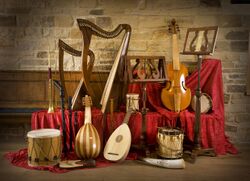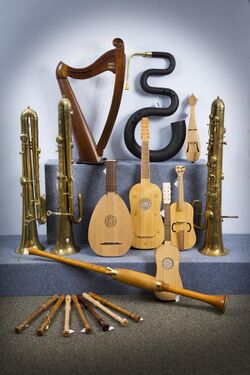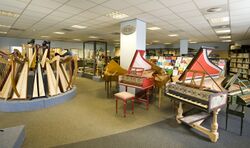Engineering:Renaissance Workshop Company
The Renaissance Workshop Company (RWC) is a manufacturer of a wide range of instruments for historical performance of the early music, specializing in the faithful reproduction of medieval, renaissance and baroque musical instruments, all based on existing originals or relevant iconography, made in their own workshops.
History
The Renaissance Workshop Company was founded in 1968 as part of The Early Music Shop in Bradford (UK), and was established as an independent company in 1999 under the management of Jonathan Askey, who had been involved in the development of the early music movement and the quality of instrument making, running the early music business since he joined J Wood & Sons Ltd. back in 1972. The Renaissance Workshop Company moved to new premises at Toledo (Spain) in 2004 when Mr. Askey reluctantly decided that, due to poor health, he would have to wind down the workshops that were effectively his life’s work.
J Wood & Sons Ltd.
In 1877, the business expanded and moved to Bradford, where after several vicissitudes, it became in 1903 the Limited Company ‘J Wood & Sons Ltd’. [1]
The Workshops
Early in the 60's, Jonathan Askey was teaching crafts in a local school in Bradford and having already made a number of guitars, he continued making some viols and other musical instruments. One of his first racketts formed part of David Munrow's collection.
He joined J Wood & Sons Ltd. back in 1972. He managed Woods Bradford music shop (The Early Music Shop) for many years.
The Renaissance Workshop Company today
Move to Toledo (Spain)
In 2007, following its acquisition by Music Sales, the headquarters for The Early Music Shop moved premises from Woods Music Shop in Bradford, and the main showroom is now situated in the renowned Salts Mill, in the centre of Saltaire, a village in West Yorkshire. Saltaire has World Heritage Site status[2], thus the new location for The Early Music Shop has benefited from the many visitors drawn to the iconic Victorian model village.[3]
Indeed, Salts Mill has been used to host many Early Music Concerts since the business' move to Saltaire, such as a concert and workshop led by renowned early musicians Rachel Podger and Pamela Thorby,[4][5] performances by Leeds Baroque Choir & Orchestra[6], and on regular occasions concerts led by Red Priest,[7][8] a British Baroque instrumental band.
After the move, the firm began offering regular tuition in its main showroom, and hosts regular recorder, viol, harp and lute lessons for students of all standards. It also includes an agency for second-hand instruments, and a repair workshop. The new showroom for The Early Music Shop has been described as "an Aladdin's Cave of affordable early music instruments",[9] and the business serves as the exclusive UK distributor for Moeck recorders, and a UK agent for: Küng recorders, Mollenhauer recorders, Bizzi harpsichords, Lu Mi viols, Camac harps and many others. Demand for historical instruments has kept increasing since the move to the new premises[3] and the business in general has been referred to as 'a treasured national institution'.[10]
A second showroom is located in Denmark Street, long-established as London's "Tin Pan Alley".[11][12]
Both branches of The Early Music Shop frequently attend a variety of Early Music courses and Festivals, involving pop-up stands and workshops, across the United Kingdom.[3] In recent years, the business has also supplied musical instruments and props for a variety of TV and film projects, including Harry Potter and the Goblet of Fire, Alexander, Kingdom of Heaven and many others.[13]
New Ownership and 50th Anniversary
After 10 years of ownership by Music Sales, The Early Music Shop was acquired in August 2018 by Chris Butler, a career music industry executive and long-term supporter of the business. [citation needed]
Revival of the Early Music Movement
Interest in early music and historical instruments increased following David Munrow's success,[14] particularly in the music he produced for the TV series The Six Wives of Henry VIII in 1971.[15] Munrow's score for this series featured authentic music using only historical instruments, thus generating much enthusiasm for early musical instruments and music from the renaissance period across audiences worldwide.[16] Munrow himself was a loyal and enthusiastic customer of J Wood & Sons Ltd., having fiercely encouraged Richard Wood to start up a business specialising in these historical instruments,[17] and even helped devise the name of "The Early Music Shop".[1]
Consequentially, demand for renaissance instruments increased, and so The Early Music Shop began trading with other businesses in the same field, such as Moeck and Mollenhauer, and began holding an exhibition in London for all makers and publishers involved in early music in order to generate publicity. As a result, the business continued to grow, and moved to Manningham Lane in Bradford in 1987 as part of Woods Music Shop, where it continued to produce historical instruments and kits in its workshops.[1]
London International Exhibition of Early Music
Since 1973, The Early Music Shop has hosted an international exhibition of early music in London, which includes various concerts and instrumental performance competitions, and is attended by approximately 100 exhibitors from the UK and overseas.[1]
The exhibition features a vast display of early musical instruments, music publishers and societies[18], and is said to reflect "the constantly growing interest in performing early music".[17]
First hosted at the Royal College of Music, the event moved to the Royal Horticultural Halls, before moving back to the Royal College of Music, where it became an annual event. In 2002 the exhibition moved to Greenwich, but now takes place at Blackheath Halls, London's oldest surviving purpose-built cultural venue.[18]
References
- ↑ 1.0 1.1 1.2 1.3 Smith, Adrian (2000). Music Making in the West Riding of Yorkshire. R. H. Wood Publishing. pp. 122–123. ISBN 9780953988501.
- ↑ "Saltaire World Heritage Site". http://www.saltairevillage.info/.
- ↑ 3.0 3.1 3.2 "'We are in tune with customers'". Bradford Telegraph and Argus. https://www.thetelegraphandargus.co.uk/news/8362731._We_are_in_tune_with_customers_/.
- ↑ "Saltaire World Heritage Site". http://www.saltairevillage.info/news-00132_Baroque_Bop_Workshop_240409.html.
- ↑ "Saltaire World Heritage Site". http://www.saltairevillage.info/news-00133_Concert_at_URC_on_02_May_09_240409.html.
- ↑ "About". https://www.leedsbaroque.org/about.html.
- ↑ "Saltaire World Heritage Site". http://www.saltairevillage.info/news-00368_Red_Priest_260117.html.
- ↑ Young, Chris (March 2017). "Hundreds of children wowed by 'Gypsy Baroque' concerts in Saltaire". Telegraph & Argus. https://www.thetelegraphandargus.co.uk/news/15131373.Hundreds_of_children_wowed_by___39_Gypsy_Baroque__39__concerts/.
- ↑ "The Early Music Shop | Shop – Music | Saltaire|West Yorkshire". https://www.visitbradford.com/thedms.aspx?dms=3&venue=3600058.
- ↑ Pettitt, Stephen (Winter 2007). "Moving With The Times". Full Score.
- ↑ "Denmark Street". http://hidden-london.com/the-guide/denmark-street/.
- ↑ "Denmark Street – the history of Denmark Street as the centre of the music industry in London". http://www.underground-england.co.uk/news/denmark-street-the-history-of-denmark-street-as-the-centre-of-the-music-industry-in-london/.
- ↑ Holland, Chris (February 2008). "Bradford Shop Supplies Period Instruments For Films". Telegraph & Argus.
- ↑ Hewett, Ivan (2012-05-23). "David Munrow: Tragic genius who brought early music to the masses". ISSN 0307-1235. https://www.telegraph.co.uk/culture/music/classicalmusic/9285826/David-Munrow-Tragic-genius-who-brought-early-music-to-the-masses.html.
- ↑ "David Munrow (1942–1976) – A discography". http://www.medieval.org/emfaq/performers/munrow.html.
- ↑ "David Munrow – Henry VIII & his Six Wives". https://www.classicstoday.com/review/review-10241/.
- ↑ 17.0 17.1 Crel, James (Autumn 2011). "In the meantime...". Early Music Today: 12–13.
- ↑ 18.0 18.1 Horsewood, Adrian (October 2018). "Exhibition of Early Music returns to Blackheath". Classical Music Magazine, Rhinegold Publishing Ltd.: 61.
External links
- Official website
- http://www.saltsmill.org.uk/
- https://www.blackheathhalls.com/whats-on/the-london-international-early-music-festival




